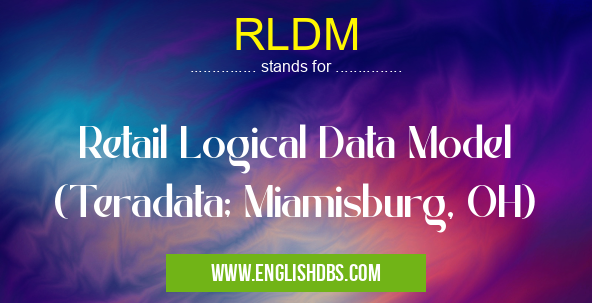What does RLDM mean in BUSINESS
RLDM stands for Retail Logical Data Model, a comprehensive data model designed specifically for the retail industry. Developed by Teradata, a leading data management company, RLDM provides a standardized framework for organizing and managing retail data.

RLDM meaning in Business in Business
RLDM mostly used in an acronym Business in Category Business that means Retail Logical Data Model (Teradata; Miamisburg, OH)
Shorthand: RLDM,
Full Form: Retail Logical Data Model (Teradata; Miamisburg, OH)
For more information of "Retail Logical Data Model (Teradata; Miamisburg, OH)", see the section below.
Features of RLDM
- Comprehensive Coverage: RLDM encompasses a wide range of retail data, including customer demographics, sales transactions, product inventory, and supply chain information.
- Hierarchical Structure: The model is structured hierarchically, with data entities organized into logical categories and subcategories.
- Conceptual Modeling: RLDM uses conceptual modeling techniques to represent data relationships and business rules.
- Extensibility: The model is designed to be extensible, allowing organizations to customize it to meet their specific needs.
Benefits of Using RLDM
- Data Standardization: RLDM provides a common data language, enabling seamless communication and data sharing within retail organizations.
- Improved Data Quality: The standardized structure of RLDM helps ensure data consistency and accuracy.
- Enhanced Analytics: By organizing data in a logical way, RLDM facilitates in-depth analysis and reporting.
- Increased Efficiency: The hierarchical structure simplifies data retrieval and reduces the need for complex joins.
Essential Questions and Answers on Retail Logical Data Model (Teradata; Miamisburg, OH) in "BUSINESS»BUSINESS"
What is the Retail Logical Data Model (RLDM)?
The Retail Logical Data Model (RLDM) is a standardized data model designed specifically for the retail industry. It provides a common framework for representing and managing retail data, enabling organizations to integrate data from diverse sources and gain insights into their business operations.
Who developed the RLDM?
The RLDM was developed by Teradata, a leading provider of data warehousing and analytics solutions.
What are the benefits of using the RLDM?
The RLDM offers several benefits, including:
- Standardized data representation: It provides a consistent way to represent retail data, facilitating data integration and analysis.
- Improved data quality: By adhering to the RLDM's data standards, organizations can ensure the accuracy and consistency of their retail data.
- Enhanced decision-making: The RLDM provides a comprehensive view of retail data, empowering businesses to make informed decisions based on reliable insights.
What types of data does the RLDM cover? A: The RLDM covers a wide range of retail data, including: - Customer information: customer demographics, purchase history, loyalty data - Product information: product attributes, sales data, inventory levels - Transaction dat
The RLDM covers a wide range of retail data, including:
- Customer information: customer demographics, purchase history, loyalty data
- Product information: product attributes, sales data, inventory levels
- Transaction data: sales transactions, returns, exchanges
- Store information: store locations, sales performance, staffing levels
How is the RLDM structured?
The RLDM is organized into a hierarchical structure, with the following key components:
- Entities: Represent real-world objects (e.g., customer, product, store)
- Attributes: Describe the characteristics of entities (e.g., customer name, product price, store location)
- Relationships: Define the connections between entities (e.g., customer purchases product, product is sold in store)
Final Words: RLDM is a powerful data model that provides a solid foundation for managing complex retail data. Its standardized structure, comprehensive coverage, and extensibility make it a valuable tool for organizations seeking to optimize their data management and analytics capabilities. By adopting RLDM, retailers can unlock the full potential of their data and gain a competitive edge in the fast-paced retail industry.
